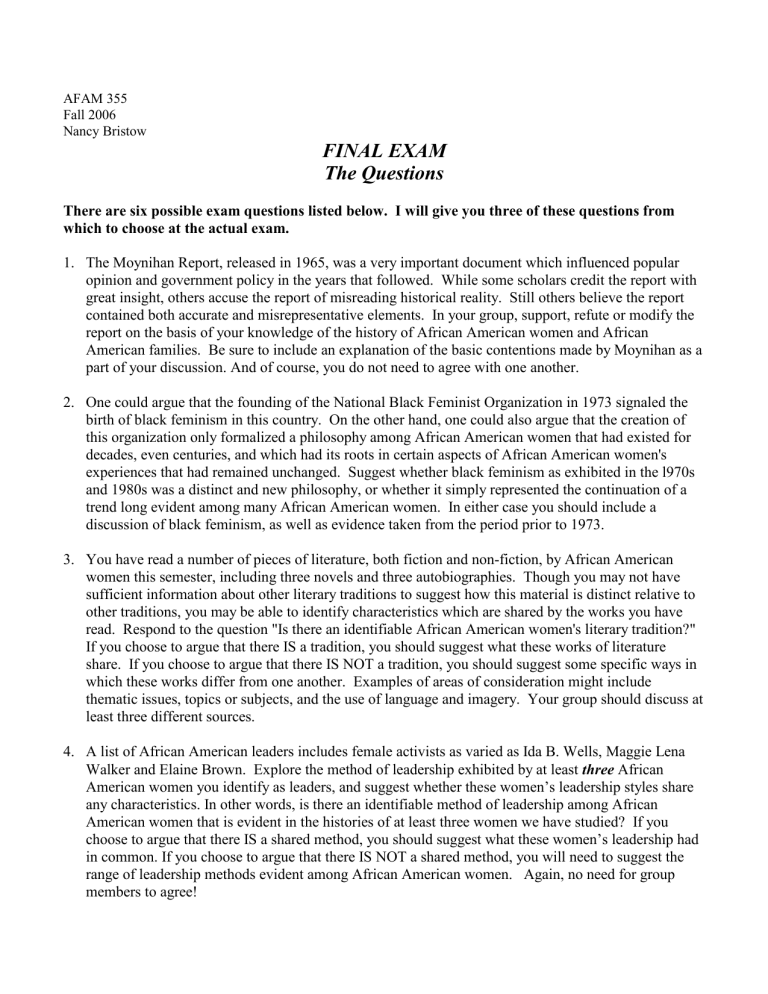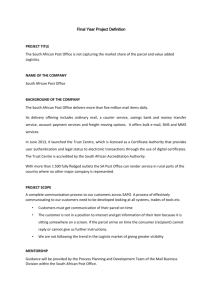Oral Final Exam: The Questions

AFAM 355
Fall 2006
Nancy Bristow
FINAL EXAM
The Questions
There are six possible exam questions listed below. I will give you three of these questions from which to choose at the actual exam.
1. The Moynihan Report, released in 1965, was a very important document which influenced popular opinion and government policy in the years that followed. While some scholars credit the report with great insight, others accuse the report of misreading historical reality. Still others believe the report contained both accurate and misrepresentative elements. In your group, support, refute or modify the report on the basis of your knowledge of the history of African American women and African
American families. Be sure to include an explanation of the basic contentions made by Moynihan as a part of your discussion. And of course, you do not need to agree with one another.
2. One could argue that the founding of the National Black Feminist Organization in 1973 signaled the birth of black feminism in this country. On the other hand, one could also argue that the creation of this organization only formalized a philosophy among African American women that had existed for decades, even centuries, and which had its roots in certain aspects of African American women's experiences that had remained unchanged. Suggest whether black feminism as exhibited in the l970s and 1980s was a distinct and new philosophy, or whether it simply represented the continuation of a trend long evident among many African American women. In either case you should include a discussion of black feminism, as well as evidence taken from the period prior to 1973.
3. You have read a number of pieces of literature, both fiction and non-fiction, by African American women this semester, including three novels and three autobiographies. Though you may not have sufficient information about other literary traditions to suggest how this material is distinct relative to other traditions, you may be able to identify characteristics which are shared by the works you have read. Respond to the question "Is there an identifiable African American women's literary tradition?"
If you choose to argue that there IS a tradition, you should suggest what these works of literature share. If you choose to argue that there IS NOT a tradition, you should suggest some specific ways in which these works differ from one another. Examples of areas of consideration might include thematic issues, topics or subjects, and the use of language and imagery. Your group should discuss at least three different sources.
4. A list of African American leaders includes female activists as varied as Ida B. Wells, Maggie Lena
Walker and Elaine Brown. Explore the method of leadership exhibited by at least three African
American women you identify as leaders, and suggest whether these women’s leadership styles share any characteristics. In other words, is there an identifiable method of leadership among African
American women that is evident in the histories of at least three women we have studied? If you choose to argue that there IS a shared method, you should suggest what these women’s leadership had in common. If you choose to argue that there IS NOT a shared method, you will need to suggest the range of leadership methods evident among African American women. Again, no need for group members to agree!
5.
In describing her family’s embracing of freedom as a result of the Civil War, one African American woman recalled, “I heard [my grandmother] say some people came early one morning and said they
[the slaves] were free. Some cried, but my big mom just called her whole family together and walked away. My great aunt said that by noon my grandmother had found work for herself and had a shed for everybody in the family to live in. She’d say, ‘Freedom never scared a colored person—that’s one lie told.’” As this story suggests, the pursuit of real freedom has been a theme in the history of African
American women since 1619, and has persisted long after the end of formal slavery. Even so, African
American women have made important strides in acquiring an expanding freedom. Can you identify those methods that have proven most effective for African American women in their pursuit of meaningful freedom? To answer this question you’ll need to discuss both the range of methods
African American women have employed and the methods that have brought the most meaningful results. This discussion will, in turn, likely require you to talk about the nature of the various freedoms they have sought. Your group should be sure to cover both the period of slavery and at least one period after emancipation.
6. In concluding their text, Darlene Clark Hine and Kathleen Thompson suggest, “Black women are survivors. They have developed values over almost four centuries that actually seem to work.” While it is impossible to delineate a value system shared by all African American women over the last three centuries, these historians suggest that it may be possible to identify certain values which have been embraced by many African American women despite their different circumstances, their different roles, and the passage of time. Discuss whether there are any values evident consistently throughout the almost four hundred year history we have studied. If so, what are these values? Have they evolved over this period in any way? If you do not find any values consistently shared, are there particular reasons for differences in values among African American women that reach beyond purely personal differences?
THE GROUPS FOR THE FINAL EXAM:
8:00
Derek Beuning
Travis Halterman
Lea John
Alex Lichty
10:00
Brie Adderley
Anne Grey
Whitney Holt
Lauren Miller
Jonee Winnick
8:30
Faisal Alisdairi
Casey Dillon
Sam Fogelman
Katie Gillette
Stephanie Senescall
10:30
Marissa Cain
Erin Goldsmith
Kendra Loebs
Tim Strauhal
9:00
Lilah Gliksohn
Nicki Leonard
Spencer Naar
April Postell
Antwan Williams








